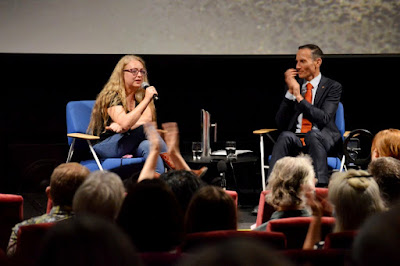
It's just a coincidence or a community affectation, of
course, but Volodymyr Zelenskyy also has repeating letters at the end of his
name. Funny to see, that's all. I had an itch to see a hiphop gig. I know little of it. The YT videos I'd seen were produced not
live, so I know the singing style, but not the musical support, or at least the
live accompaniment. How much was
recorded; how much performed? And this
gig had 3 performers so it provided a survey of the scene. First up was Jedbrii backed by a drummer and
another. I still don't know what the
other was playing, but there was always bass and often I could hear other
instruments, electronics, etc. I searched
hiphop instuments on the Net and the range was everything from DJ kits to drum
machines to loopers and more.
Intriguing. And those intense
drums, clumsily timed (in jazz terms, of course, not in its own terms), drunken
perhaps (a style of drumming, not a level of inebriation). And various descriptions I didn't fully
understand like freestyle and rap itself I think I now understand the difference of
rap vs hiphop. Anyway I'm learning.
Jedbrii was busy, interesting, rhythmic, interactive. I liked his set. Those odd comments, real sick, etc. That traipsing back and forth across the
stage. Those tunes that sat then just
stopped and those drum explosions whereever.
Rhythm is all here. Then on to
Kirklandd. The same drummer stayed on,
but no third performer. There was a
mention of Viktor Rufus being unavailable, replaced by a cutout of Dave Grohl. Lots
of recorded backing, lots of traipsing, but I found this less satisfying, more
poppy, less open and authentic (some may disagree). I felt Freddie Mercury. Maybe it's the various rock-star affectations:
the neat cut and dyed tips, the personalised jumpsuits, the audience
participation, the mounting of monitors, the bared chests later in the show (yes,
he could get away with it). And music
that seemed as much pop as rap, despite the rhymes and rhythms. My bad perhaps but I was left cold. Then Citizen Kay. First up I watch a different drummer setting
up. Very professional: fast, neat,
ordered, changed cymbals and snare, adjustments, sound checking each drum, methodical
and efficient. I noticed one new bloke
at the desk interacting with the drummer.
I expect CK had his own mixer: it would explain a tighter bass sound,
better sound overall. I'd noticed this
with Dave Holland at Wangaratta JF and how the sound was so, so different with
his own sound man. Then a suite of neat
and attractive tunes, nicely structured, more richly embellished with solos and
voices and chordal patterns in the background recording, and that drummer,
sharp and tight and purposeful and beautifully toned but also not excessive in
performance. Again, that
professionalism. It particularly showed
when CK did his first single as an encore, which he admitted he wasn't too
prepared for. Good on him to be so
playful and uncautious. It was nowhere
like the sophistication of the show, just demonstrating how we grow into
skills. And he obviously had. Citizen Kay was loud but he was also a great pleasure
to hear and see. So, an informative show for me, reaching out
from a jazz cocoon with much pleasure.
Jedbrii, Kirklandd and Citizen Kay appeared at Transit
Bar.
This is CJBlog post no. 2,450
















